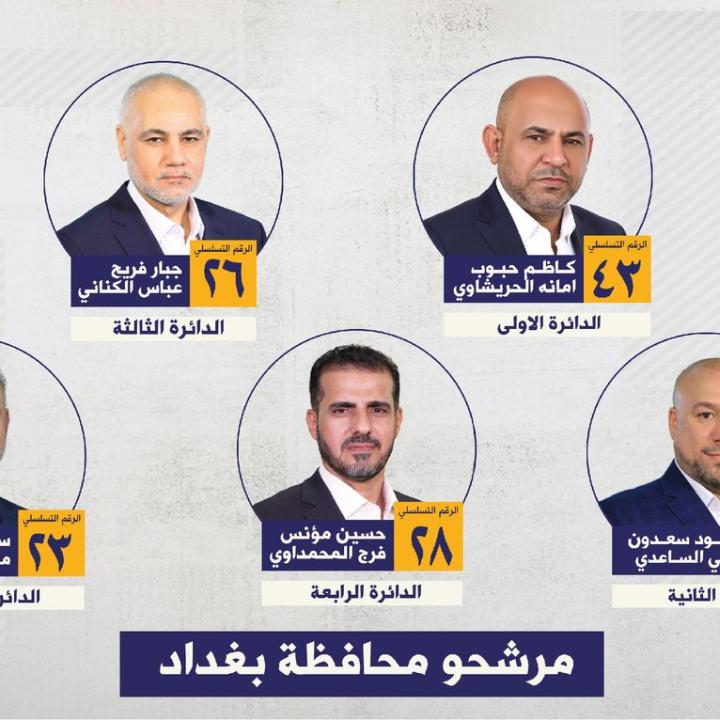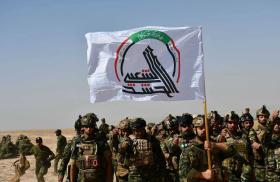
The Hoquq Candidates: Kataib Hezbollah’s Aspiring Parliamentarians

Hoquq is competing head-to-head with other "resistance" factions in key Shia constituencies, especially Asaib Ahl al-Haq.
The Harakat Hoquq (Rights Movement) electoral list, which is led by Kataib Hezbollah (KH) member Hossein Moanes (aka Abu Ali al-Askari), will field thirty-two candidates in its inaugural election run on October 10. Much can be gleaned from Hoquq's list and the electoral districts in which it will compete—most notably, that it is vying for the same voters as other Iran-backed elements such as Hadi al-Ameri’s Fatah Alliance and Nouri al-Maliki’s State of Law bloc.
Hoquq Focusing on Shia Voters in Southern and Central Iraq
Most of Hoquq's campaign efforts have focused on eleven provinces, ten of them Shia-majority. It is fielding one candidate in each in the following districts:
- Baghdad districts 1 (Nahrawan), 2 (Sadr City), 3 (Sadr City), 4 (Sadr City, where Moanes is running), 5 (Palestine Street), 7 (Rusafa), 9 (New Baghdad), 11 (Shula), 14 (Arab Jabour), and 15 (Radwaniyah)
- Basra districts 1 (Basra city), 3 (Basra city), 4 (Zubayr), 5 (Qurnah and Madinah), and 6 (Faw)
- Dhi Qar districts 2 (Nasiriyah south), 3 (Fajr, Rifai, Qalat Sukkar), and 5 (Shatrah)
- Najaf districts 1, 2, and 3
- Babil districts 3 (Mahawil) and 4 (Musayyib, next to KH's Jurf as-Sakr base)
- Maysan districts 1 and 2 (both Amara)
- Karbala districts 2 (Hindiya, south of Jurf al-Sakhar) and 3 (Tuwairij)
- Qadisiyah districts 1 and 2 (both Diwaniyah)
- Wasit district 1 (al-Kut city)
- Diyala district 4 (Khanaqin, Jalula)
- al-Muthanna district 1 (Samawa)
This list shows that Hoquq is not aiming to make gains in “new” territories (e.g., Shia Turkmen areas, Yazidi areas, or parts of Anbar where KH has a strong military presence), but is instead competing head-to-head in the same constituencies as Fatah and State of Law. Whereas Fatah’s components (principally Badr and Asaib Ahl al-Haq, or AAH) have carefully deconflicted their candidate lists, Hoquq appears willing to upset this arrangement, bringing to mind last month's incident in which Moanes criticized establishment parties, which Fatah interpreted to include itself.
It is difficult to ascertain whether Hoquq is targeting any particular part of the Fatah powerbase, for instance the constituencies in which AAH is focused. Considering the bad blood between KH and AAH and the way Hoquq is lightly campaigning in Badr’s Diyala homebase, this may be a possibility. Notably, Hoquq has stayed away from all key Badr constituencies in Diyala except District 4, where AAH has its only major ground presence in the province. In general, Hoquq seems to be aiming at Sadrist areas (Amarah, Sadr City, Najaf, Gharraf River Valley), whether those constituencies are linked to Muqtada al-Sadr's Sairoon list or factions led by Qais al-Khazali and AAH.
The cluster of KH candidates in constituencies surrounding the group's Jurf al-Sakhar base underlines the manner in which it seeks to dominate Baghdad's southern rural arc, northern Karbala, and road corridors to Anbar. The risk of voter intimidation in Sunni areas south of Baghdad (Radwaniyah, Arab Jabour, Musayyib) will be high due to the presence of KH forces; indeed, the group may be mimicking AAH's use of militias to control northern Baghdad Sunni voting centers in 2018.
The Hoqouq Candidates
Hoquq is taking a leaf from its forerunner, AAH’s al-Sadiqoun bloc (which won one seat in 2014 and fifteen in 2018), by running candidates who appear primarily technocratic and are mostly in their forties (which counts as young in Iraqi politics). At least half of its thirty-two candidates appear to be academics with degrees in political science, business management law, or media studies. Seven are women, including one self-identified “feminist,” one avowed campaigner for “women’s rights,” and one with an eclectic interest in nanotechnology. Only one or two candidates have a claimed connection to the Popular Mobilization Forces (PMF).
The likeliest Hoquq winners are Moanes in Baghdad district 4 (Sadr City), Abbas Falah Enad Ardawi (the founder of Hadaf, a think tank for media and research training) in Baghdad district 11 (Shula), and former provincial governor Malik Khalaf Wadu al-Durai in Wasit district 1. Hoquq seeks to best AAH's electoral debut in 2014 (one seat) but is unlikely to match the fifteen seats that Sadiqoun won in 2018. Nevertheless, it will gain a foothold that can be expanded. This is part of the development of KH's political, social, and economic arms, to sit alongside its special operations (Abu Hussein) and military/PMF (Abu Fadak) wings.




